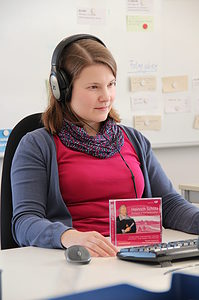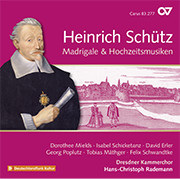Tension that gets under your skin
One of her favorite times in every CD production is the moment when Anna Bockisch receives the final CD master on her desk – what a privilege to be able to listen to the end result of a long project as the first person after the sound engineer and performers. And sometimes there are recordings which captivate you so completely that all other work priorities have to give way to a pure, euphoric listening experience.
One of my favorite times in every CD production is the moment when I receive the final CD master on my desk – what a privilege to be able to listen to the end result of a long project as the first person after the sound engineer and performers. Of course, in the working day of a CD editor this is coupled with some work alongside the pleasure of listening – in the main, listening through to a recording goes along with a last proof-reading of the song texts in the booklet, and checking the correct listing of the musicians on the individual tracks; in rare cases there might also be a query back to the sound engineer.
But then there are sometimes recordings which captivate you to such an extent that all other work priorities have to give way to a pure, euphoric listening experience. It is particularly delightful when – as with the “Madrigalen & Hochzeitsmusiken” (Madrigals and Wedding Music) by Heinrich Schütz – this happens on a Friday afternoon at the end of a long working week.
I cannot explain precisely how this special goose-bumps feeling was induced in me on hearing this CD – from the very first to the very last minute. Is it the unusual lightness which can indeed also be sensed in Schütz’s sacred works, but is seldom as clear as in these few secular works by him which survive? Is it the skilful interplay of the vocal parts and the instruments found to the very last minute on the recording? Is it the refined musical twists and turns which we can hear in the cornetts, for example? Or is it the perfect vocal harmonies of the wonderful group of soloists? (Just a few examples of this amongst many are “Nachdem ich lag in meinem öden Bette” SWV 451 and “Lässt Salomon sein Bette nicht umgeben” SWV 452 with the soprano Dorothee Mields and bass Felix Schwandtke.)
Whatever the precise reason might be, through the “Madrigale & Hochzeitsmusiken” I have been able to experience Heinrich Schütz, who was already one of my favorite composers, in an entirely new way. Consequently Vol. 19 is my new undisputed favorite CD in the whole Schütz Complete Recording – a place previously held by Vol. 3 in the series (the ‘”Musikalische Exequien”). It only remains to hope that the last installment of the Heinrich Schütz Complete Recording, to be released in June, might top this.
Musicologist and active choral singer Anna Bockisch has been CD editor at Carus since 2010. Now and again she amuses her colleagues with her childlike pleasure when a new favorite CD arrives hot off the press.





Leave a Reply
Want to join the discussion?Feel free to contribute!